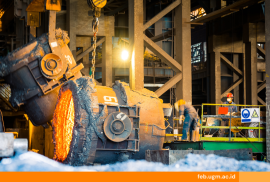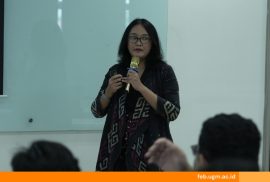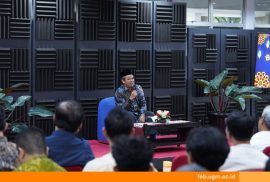Indonesia has graduate from a low-income country to a middle-income country in the 1990s. Aside from the 1998 Asian financial crisis, Indonesian economy performed quite well and Indonesia was one of the top performers in the region. Indonesia also managed stable economic growth post the 1998 crisis. For example, in the past 5 years, economic and investment growth has been hovering around 5%. In the 2020-2024 mid- and long-term development plan, the government is aiming an economic growth of 6% in the optimistic phase. The key question is, how can Indonesia sustain a high economic growth?
Modern economic growth models suggest that human capital (Heckman, Lochner, and Taber, 1998; Manuelli and Seshadri, 2006; Lucas, 1988; Acemoglu and Angrist, 2000, Aghion, Howitt, and Violante, 2004) and institutions (Alesina and Rodrik, 1994; Persson and Tabellini, 1994; Forbes, 2000; Banerjee and Duflo, 2003; Saint-Paul and Verdier, 1993; Benabou, 2000) are two important drivers of economic growth. The Indonesian government has been quite consistent in its commitment to nurturing quality and competitive human capital development and institutional strengthening. For example, the government is ever committed in providing 20% of total annual budget for education spending. Education spending was Rp390 trillion in 2015, and it increased to Rp505 trillion in 2020.
Challenges still remain. Stunting rate remains stubbornly high and educational outcomes are relatively low in comparison to other countries in the region. Youth unemployment and youth NEET is one of the highest in the region, and intensive efforts to reform labor market regulations are needed. Property rights protection is still an issue in Indonesia and Ease of Doing Business Index is still lower than Vietnam and Malaysia.
Given these challenges, how can we better spend our resources to improve human capital in the country? What are the strategies to improve human capital in Indonesia? How can Indonesia improve its institutions to incentivize innovations and business creations? The 16th Indonesian Regional Science Association (IRSA) International Conference aims, among others, to encourage more discussion on the current policies and programs in institutional strengthening and human capital development.
The conference will also provide opportunities for researchers all over Indonesia to present and their ideas on the topics of regional development, regional planning, industrial development, trade, institution, public finance and other development issues.
THEME & TOPICS
The main theme of this year’s IRSA Conference is: INSTITUTIONS, HUMAN CAPITAL, AND DEVELOPMENT
Topics to be discussed in the conference include:
- Institutions and economic growth
- Institutional economics of corruption and reform
- Agricultural, natural resources, and rural institutional development
- Property rights and innovations
- Institution and environmental management
- Religion and its long-term impact
- Social capital and trust
- Early childhood development and long-term outcomes
- Curriculum, pedagogy, education technology and student achievement
- Education spending and educational outcomes
- Regional disparities in educational outcomes
- Teacher labour supply and teacher incentives
- Skills development and vocational training
- Health and economic growth
- Child and mother health in developing countries
- Demand and supply of health care
ABOUT THE IRSA INTERNATIONAL
Conference
The IRSA conference is IRSA’s main annual event that promotes the advancement of research across the country. The conference will facilitate open discussions and debates, transfer of knowledge, strategies for policy formulation, and networking amongst scholars and policymakers. Each year since its establishment, the IRSA annual conference has been attended by a large number of academics and policymakers from numerous Indonesian institutions. IRSA has also created a large network of academics and policymakers who are concerned with issues of regional development. This network has now reached a critical mass that can play a major role not only in the academic arena through research and publications but also contribute to the evidence-based regional development policies nationally, regionally, and locally.
Hosts and Organizers
The 16th Indonesian Regional Science Association (IRSA) International Conference is going to be hosted by the Faculty of Economics and Business at Universitas Gadjah Mada in collaboration with IRSA. Universitas Gadjah Mada is the main public university in Daerah Istimewa Yogyakarta, and it plays an important role in promoting research and education in Indonesia.
Time and Venue
The annual conference will be held on July 13-14 2019 in Faculty of Economics and Business Universitas Gadjah Mada, Yogyakarta, Daerah Istimewa Yogyakarta, Indonesia.
IMPORTANT DATES
Important Dates
- Jan 6, 2020 : Abstract Submission Opening
- Apr 6, 2020 : Abstract Submission Deadline
- May 4, 2020 : Early Bird Registration Open
- May 4, 2020 : Notification of Abstract Acceptance
- Jun 1, 2020 : Early Bird Registration End
- Jun 22, 2020 : Full Paper Submission Deadline
- Jun 22, 2020 : Paper Presenter Registration Deadline
- Jul 6, 2020 : Non-Presenter Registration Deadline
- Jul 11-12, 2020 : Pre-conference training
- Jul 13-14, 2020 : Conference Date
For further information can access to http://yogyakarta2020.irsa.or.id




